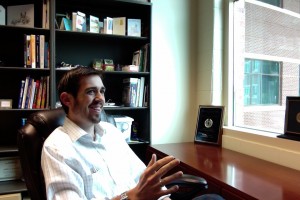By Ben Murray
I recently met with Dr. Michael K. Scullin, Director of the Sleep Neuroscience and Cognition Laboratory in Baylor’s department of Psychology. Scullin is something of a newcomer to our university, arriving here last December. He began his education at Furman University and graduated in 2007 with a B.S. After finishing at Furman, he moved to St. Louis where he attended Washington University and completed his doctorate in the Behavior, Brain and Cognition program. Scullin then worked on a post-doctoral fellowship in the Neurology and Sleep Medicine program at Emory University’s School of Medicine before finally landing at Baylor.
Our meeting was about a project that he actually started about five years ago. During his time in graduate school, Scullin took on a leadership position with the American Psychological Association (APA)—the largest scientific and professional organization representing psychology in the U.S. They asked him to chair a new science committee at the school. He says he was unsure of his role at the beginning, but after being told to “dream big,” Scullin began to plan for a new project. He recalled some of the frustrations that he had encountered during the publishing process. When he submitted papers to journals, Scullin often found the reviews from his future colleagues to be unhelpful and pedantic—frequently littered with arbitrary corrections and unnecessary edits. He realized that the peer review process could be greatly improved, and with this realization he decided to start his own peer reviewed journal for graduate students, by graduate students.
Fast forward five years and TPS (Translational Issues in Psychological Science) is a full-fledged, critical issues translational journal, with each issue focusing on a different topic representing multiple viewpoints on psychological science. Scullin says the journal’s road to completion was not easy. At first the idea was met with substantial resistance. He explains that “journals marked as graduate student journals are usually not considered to be reputable. This is because they are always put on by small agencies and never sponsored by large, reputable publishers.” TPS is unique in that it is backed by the APA. This basically acts as a stamp of approval and legitimacy for scholars. Perhaps the most innovative element of TPS comes from its website where a training portal is available for those who are new to peer editing. The portal begins with general info such as the peer review process and why it is important. Then, it goes into depth on how to write an effective, constructive review. For example, how to avoid unhelpful critiques, evaluate theories used, and frame constructive comments.
In the past, when people were asked to review papers, they would often mimic the types of responses they themselves received when their papers were reviewed. Too often, these new reviewers would repeat the same bad habits as reviewers before them because they didn’t know any better. TPS’s program is designed to break that cycle. When a graduate student writes a review, their review is reviewed (ha) by experienced post docs who operate under an established professor. This forces reviewers to watch what they write because they know that their work will be evaluated by a second set of eyes. As Scullin says, “Peer review is essential to every scientific article that’s ever been published, and how the author’s results are finally reported can be greatly altered by their editors. Teaching individuals at an early stage in their career to give effective, non-arbitrary reviews will not only improve the process but will also help to improve science in general.”
Dr. Scullin is excited to see Baylor students get published in future issues of TPS. The journal is an excellent opportunity for them to gain experience and is surely a resume booster for anyone involved with the publication. It’s great to hear about innovative ideas that can really change academics for the better. As always, we’re grateful for Dr. Scullin’s time in explaining his groundbreaking work here at Baylor.

Leave a Reply